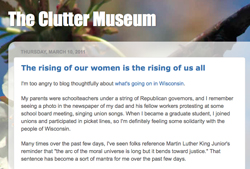Let’s begin today with Robert Penn Warren‘s poem “Founding Fathers, Early-Nineteenth-Century Style, Southeast U.S.A.” It begins,
They were human, they suffered, wore long black coat and gold watch chain.
They stare from daguerreotype with severe reprehension,
Or from genuine oil, and you’d never guess any pain
In those merciless eyes that now remark our own time’s sad declension.
Warren then shares a sampling of their characters and struggles. His is not a complimentary retrospective. Of one of his own ancestors, the speaker writes, allegedly quoting a book, “‘Little learning but shrewd, not well trusted.’ Rides thus out of history, neck fat and napeless.”
Still, the poem’s speaker suggests, we can glean some of their wisdom by acknowledging both their faults and their small victories. (Of course, Warren being a Southerner of a particular age who was age partial to both New Criticism and Jefferson’s agrarian middle landscape, he and I likely would learn different lessons from these ancestors.)
So let us bend ear to them in this hour of lateness,
And what they are trying to say, try to understand,
And try to forgive them their defects, even their greatness,
For we are their children in the light of humanness, and under the shadow of God’s closing hand.
But on to yesterday’s sonnet.
Founders, early 21st-century-style, U.S.A.
Penn Warren lent them black coats, shining chains,
the Lord. He reminded us they suffered.
An alabaster Washington was framed
by Williams: “Too powerful for comfort”
of women or his slaves. Yet some had gleaned
equality was not impossible.
Emancipated thinking led to dreams
of coalitions grown unstoppable.
Miranda’s crafted more than pop lyrics—
gave immigrants their due. He made us woke.
We question narratives, why stories stick,
why textbooks pacify more than provoke.
His music’s paradoxical and sage:
Brown founders sing their new selves on the stage.
I like sonnets because they’re constrained, but the writer can subvert the relentless iambs for subtle (or not so subtle) effect. So, for example, that last couplet can scan as iambs, but the last line opens itself to alternative stresses. It should be “Brown FOUNDers SING their NEW selves ON the STAGE,” but if you read it aloud, you more likely placed the stresses something like this: “BROWN FOUNDers sing their NEW SELVES on the STAGE.”
I also like sonnets because their brevity requires me to focus on a single idea, which has never been a strength of mine in conversation, poetry, or prose. I also like the “turn” at the end of the English sonnet; many of my favorite poems, sonnets or not, end with such a turn.
However, I’m dissatisfied with the unfocused nature of the ideas in yesterday’s sonnet. The lines seem blunted.
What if I took an opposite approach today, letting the lines grow as Warren’s do—or stretch with abandon (at least relative to the sonnet), in the style of, say, Jorie Graham? (For example, from “Covenant”: “. . .Who could have known a glance could be / so plastic. Rubbery and pushing-down on all the tiny hissing overbright greens.”)
They were human, they suffered, they scratched
at mosquito bites until they bled. They bore small scars,
some visible, some not. These crowded rooms,
inspired declarations, thickened manifestos’ ink.
Their insecurity soaked linen collars and wool frocks.
Men of many words marinated privately in fear.
(Hamilton’s nib audible in the wee hours of July 4:
“Nor could I dwell on the topic lest it should unman me.”)
Women, too, felt it. They wrestled, one wrote,
with “a mortifying consciousness of inferiority,”
The self-taught essayist cajoled,
threatened: “the same breath of God animates us.”
Late at night, which foundered founders more?
The king, slaves, God, the suppressed
collective intelligence of women? Perhaps John Adams
heard whispers, woke to night terrors: “Remember the ladies.”
Abigail pretended to sleep.

